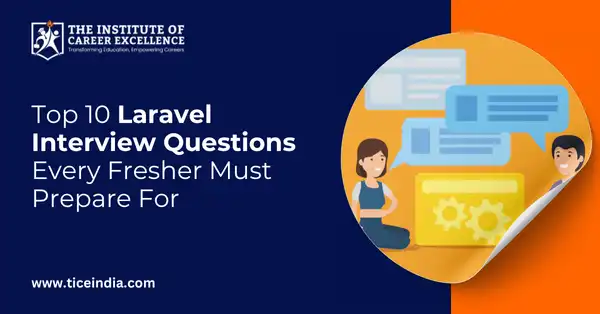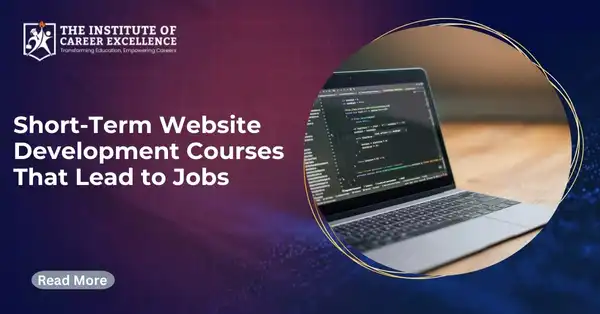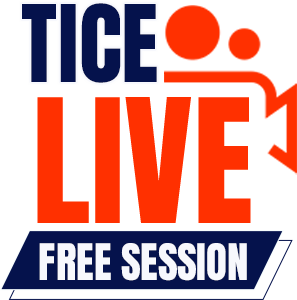
Posted On: May 14, 2025
Top 10 Laravel Interview Questions Every Fresher Must Prepare For
So, you’ve started exploring web development and stumbled upon Laravel, huh? Great pick! Laravel, a well-known PHP framework, stands out in the tech world. Many companies seek fresh talent ready to tackle Laravel fresher interview questions. To secure that first job, solid preparation is your best friend. This guide gives you the top 10 must-know Laravel interview questions for beginners. Mastering these will not just boost your interview confidence but also show why it’s crucial to have a solid grasp of PHP, which you can achieve through consistent PHP training. Let’s dive right into these key Laravel interview questions.
Top 10 Laravel Questions Every Fresher Should Know
1. Can you define Laravel and outline its main features?
Laravel is a PHP framework designed to help developers create web applications in an organized and efficient way. It offers a range of tools like the Blade Templating Engine to build dynamic views, the Eloquent ORM to work with databases, the Artisan Console to perform automated tasks, a powerful Routing System to handle URLs, and built-in Security Features such as CSRF protection. Its structure is based on the MVC architecture, which keeps your code manageable. Before diving into Laravel or tackling Laravel interview questions, it's helpful to know basic PHP concepts often taught in PHP training.
2. How would you describe the Model-View-Controller (MVC) architecture used in Laravel?
The MVC architecture acts as a foundation in Laravel. The model deals with storing and handling data while managing database interactions. The view is responsible for showing the user interface. The controller processes user inputs, works with the model, and determines which view to display. Keeping these roles separate helps developers organize code better and maintain it, ideas that are covered during PHP lessons and emphasized in Laravel practices. To grasp MVC is essential when preparing to answer basic Laravel interview questions.
3. What does Eloquent ORM do? How can you use it to work with databases in Laravel?
Eloquent ORM makes it easier to work with databases by letting you handle tables like PHP objects. For instance, calling User::all() gets every user, and User::find(5) looks up a specific user by ID. You can also use User::create(['name' => 'New User']) to add a user or $user->update(['status' => 'active']) to edit an existing one. Many PHP certification course classes focus on teaching object-relational mapping basics, which helps you grasp Eloquent, a tool often featured in Laravel interview questions.
4. Explain why Laravel's Artisan Console is useful and list a few common Artisan commands.
The Artisan Console provides a command-line tool to handle many Laravel tasks. It helps developers automate things. Beginners can start with commands like php artisan make: model Post -m to create a model with a migration, php artisan make: controller PostController -r to generate a resourceful controller, php artisan migrate to apply database migrations, php artisan route: list to show all defined routes, and php artisan serve to launch the development server. Good PHP training teaches command-line tools, which helps new developers get comfortable with Artisan. It plays a big role in Laravel fresher interview questions.
5. What is routing in Laravel? How do you set up routes?
In Laravel, routing helps connect URLs to specific actions in controllers or closures. You define routes in the routes/web.php file. For instance, Route::get('/welcome', function () { return view('welcome'); }); or Route::get('/user/{id}', [UserController::class, 'show']);. Another example is Route::get('/profile', [UserController::class, 'profile'])->name('profile');. Understanding PHP basics, often achieved by taking a PHP certification course, provides the knowledge needed to manage web requests. This is essential to answer popular Laravel interview questions.
6. Explain Laravel’s Blade templating engine and give an example of its syntax.
Blade serves as Laravel's simple and effective templating tool. It relies on directives beginning with @ to handle common PHP tasks in your views. Examples include {{ $name }} to print variables, @if ($condition) ... @endif to manage conditions, @foreach ($items as $item) ... @endforeach to create loops, and @extends('layouts.app') @section('content'), @yield('content') to manage template inheritance. To use Blade, you need to know PHP syntax, which is a key part of PHP training and appears often in Laravel interview questions for beginners.
7. How can you handle form submissions with Laravel? Describe CSRF protection.
Submitting forms in Laravel means setting up routes to process POST requests and using the $request object in the controller to handle the data. Laravel makes CSRF protection a priority. It uses a unique token provided by the @csrf directive in forms to confirm requests come from your app. Many budding developers in New Town aim to grow in web development and often join a good web development institute in Kolkata to learn such core security methods, which help prepare them for Laravel interview questions.
8. What are migrations in Laravel? How do you use them?
Migrations in Laravel work like a version control system, but for your database structure. They let you create and change tables by writing PHP code. This makes it simple to update, modify, or even reverse changes to your database. Some common Artisan commands used with migrations include php artisan make: migration and php artisan migrate. To understand migrations better, knowing database concepts is crucial, which is often taught in a solid PHP certification course. Migrations are also an important topic in Laravel fresher interview questions.
9. What is middleware in Laravel? Can you name an example of standard built-in middleware?
Middleware in Laravel helps process HTTP requests before they reach your application's routes. It serves as a link between incoming requests and your defined routes, letting you take steps like verifying users or tracking activity logs. Some common middleware includes auth, which confirms user login status, and guest, which ensures the user is not logged in. To learn request-response workflows and how these filtering tools function, a reliable web development institute in Kolkata is a good choice. These concepts are also key to tackling Laravel interview questions.
10. How is authentication managed in Laravel?
Laravel offers solid built-in authentication tools, which developers often set up through commands such as php artisan make:auth, though this may vary by version. These tools cover essential features like registering users, logging in, and resetting passwords. Core parts of this system include the Auth facade and auth middleware. To build a career in web development, students in New Town should pick a good web development institute in Kolkata. This can help them gain skills in PHP and Laravel, giving them the confidence to handle basic Laravel interview questions.
Advice for Beginners Attending a Laravel Interview
- Share what you know.
- Make an effort to grasp the ideas .
- Walk through your reasoning step by step.
- Express genuine interest in Laravel.
- Feel free to ask for more details if something is unclear during your Laravel interview questions session.
Closing Thoughts
Getting ready to ace your first Laravel job interview takes careful effort. To improve your chances, focus on the top 10 Laravel interview questions if you're new to it as a Laravel fresher or a beginner in this field. A solid base in PHP training and maybe completing a PHP certification course can help you build the skills you need. To dive into Laravel development, consider joining a trusted web development institute in Kolkata if you're nearby. Practice the ideas, work on real projects, and be ready to face any Laravel interview questions with confidence. Your journey into Laravel development is just getting started!
Tags
Latest Posts
-

10 Highest-Paid Digital Marketing Skills in Demand in 2026
-

Short-Term Website Development Courses That Lead to Jobs
-

Why India’s Tech Industry Struggles to Produce Visionary Leaders: A Skills Gap Perspective
-

Best Certification Courses After 12th for a Career in IT
-

What is Off-Page SEO Optimization? Complete Guide to Building Authority and Rankings
Similar Posts
-

Best Certification Courses After 12th for a Career in IT
-

10 Best Digital Marketing Courses in Kolkata for 2025
-

Digital Marketing vs MBA: Which Career Path Offers Better Growth in 2025?
-

How to Get Your First IT Job Without Experience in 2025
-

Why TICE India is Shaping the Future of Digital Careers: A Closer Look



